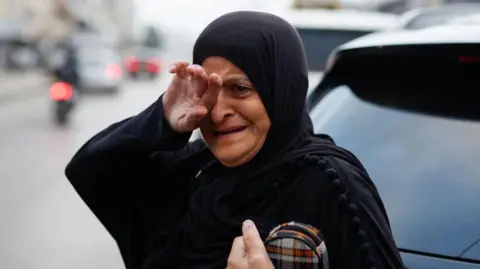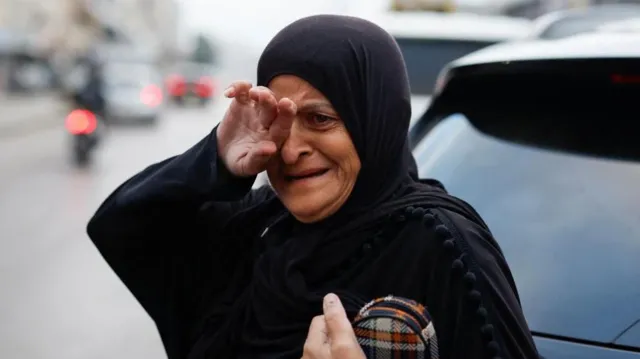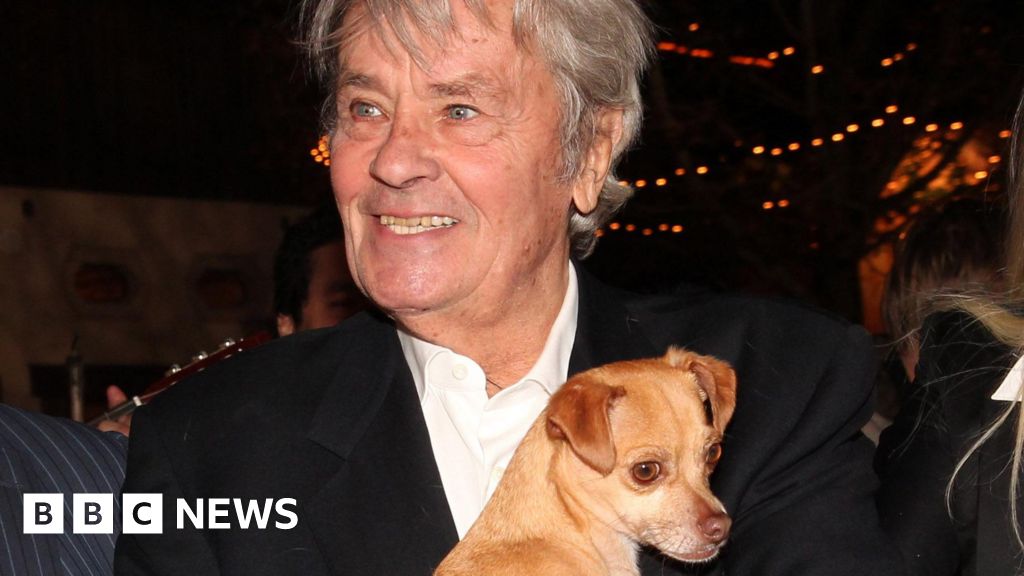 Reuters
ReutersA ceasefire between Israel and Hezbollah has come into effect in Lebanon after more than a year of fighting.
It began at 04:00 local time (02:00 GMT) on Wednesday, putting an at-least temporary end to nearly 14 months of conflict between Israel and the Iran-backed militant group.
The deal was announced on Tuesday evening by Israel, France and the US, with President Joe Biden saying it aimed to be a “permanent cessation of hostilities”.
Attacks by both sides were recorded until shortly before the ceasefire started.
Israel issued evacuation orders for parts of Beirut four hours before the ceasefire deadline, striking around an hour before. Hezbollah also fired drones into Israel in the hours before fighting stopped.
Within minutes of the ceasefire starting, the Israel Defense Forces (IDF) warned residents of southern Lebanon against “heading towards the villages that the IDF has ordered to be evacuated or towards IDF forces in the area”.
The IDF’s Arabic spokesman Avichay Adraee said on X the IDF would “inform you when it is safe to return home”.
Still, dozens of vehicles were seen heading south shortly after the ceasefire began by reporters for the Reuters news agency, some packed with personal belongings.
Fighting had been ongoing for nearly a year when, in late September, Israel intensified bombardments and launched a ground invasion against Hezbollah.
The war has been Lebanon’s deadliest in decades, killing more than 3,823 people, according to local officials.
Under the deal announced on Tuesday and brokered by the US, Israel will gradually withdraw its troops from Lebanon’s south over a 60-day period.
Over the same timeframe, Hezbollah fighters and weapons will be removed from the area south of the Litani River, a boundary established at the end of the last Israel-Hezbollah war in 2006. They will be replaced by Lebanese government forces.
“This announcement will create the conditions to restore lasting calm and allow residents in both countries to return safely to their homes,” said a joint statement from the US and France, both of which will join an existing mechanism tasked with enforcing the UN resolution previously set at the end of the 2006 war.
Lebanon’s Prime Minister Najib Mikati welcomed the ceasefire deal, calling it a “fundamental step towards restoring calm and stability” in the country and allowing citizens to return home.
But he also demanded Israel “fully comply” with the deal, leave sites it currently occupies and to respect the UN resolution.
Israel’s Prime Minister Benjamin Netanyahu said Israel would not hesitate to strike if Hezbollah breaks any part of the agreed deal.
“If Hezbollah violates the agreement and tries to arm itself, we will attack. If it tries to rebuild terrorist infrastructure near the border, we will attack,” he said.
Biden said Israel “retains the right to self defence consistent with international law”.
A snap poll for Israeli TV showed 37% of Israelis in favour of the ceasefire, 32% against and 31% saying they didn’t know.
Netanyahu also said ending the fighting in Lebanon, Israel’s northern neighbour, would allow the IDF to focus on “the Iranian threat”.
Hezbollah had long been seen as Iran’s first line of defence. But with much of the group’s missile arsenal now destroyed, the military balance between Iran and Israel appears to have tilted in Israel’s favour.
The past 13 months of fighting began when Hezbollah started firing rockets into Israel a day after its ally Hamas carried out a brutal attack on southern Israel on 7 October 2023, which killed about 1,200 people.
Netanyahu said ending the fighting in Lebanon would also increase pressure on Hamas.
“From day two of the war, Hamas was counting on Hezbollah to fight by its side. With Hezbollah out of the picture, Hamas is left on its own,” Netanyahu said.
He said ending fighting in Lebanon would also give the IDF space to resupply weapons, munitions and troops, and thus could free up more Israeli forces to serve in Gaza. Parallel negotiations to end that conflict have been deadlocked for months.
US officials have expressed some hope the Israel-Hezbollah ceasefire will provide momentum for a breakthrough in the Gaza talks. On Tuesday, Biden said his administration was working with Turkey, Egypt and Qatar to “make another push” on a deal.
No US troops will be deployed to enforce the current ceasefire, US officials clarified.
The war has been devastating for Lebanon, where, in addition to the 3,823 people killed and 15,859 injured, one million residents have been displaced in areas where Hezbollah holds sway.
Israel went on the offensive against Hezbollah – which is proscribed as a terrorist organisation by Israel and many Western countries – after almost a year of cross-border fighting sparked by the war in Gaza.
It has said it wants to ensure the safe return of about 60,000 residents of northern Israeli areas displaced by rocket attacks, which Hezbollah launched in support of Palestinians.
Hezbollah attacks on Israel and the occupied Golan Heights have killed at least 75 people, more than half of them civilians, while more than 50 soldiers have been killed in combat in southern Lebanon, according to Israeli authorities.




